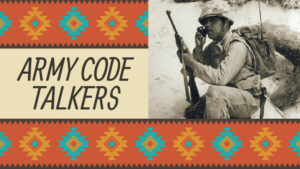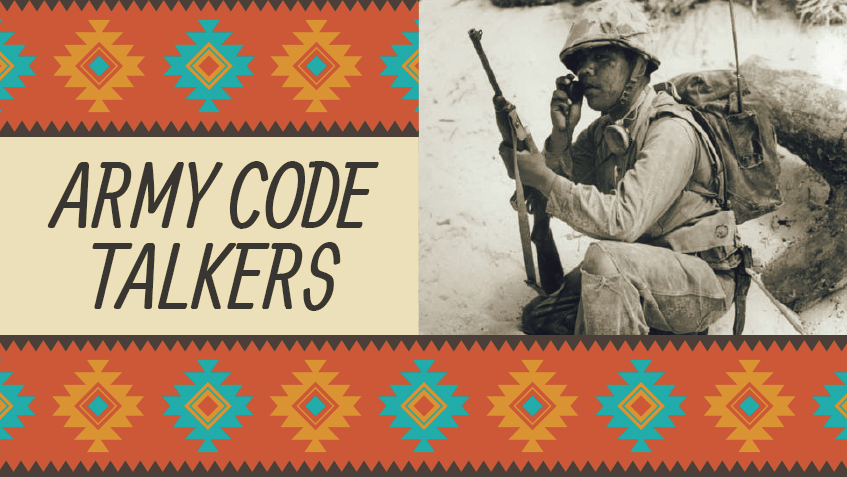Native Americans in the U.S. Army, Code Talkers, Retrieved, 20 August 2023,http: Army.mil. Pike. David.The Importance of Communications in the Military. Retrieved, (2021), Retrieved 19 August 2023,http:blog.sametec.com. Lincoln Riddle,GuestAuthor, Much More Than Code Talking – The Role of Native Americans in World War
11. Nov 12, 2016. Retrieved 21 August 2023.
Article by Lishamarie Hunter
Army Code Talkers
A Navajo Code Talker relays a message on a field radio. The code talkers served in the South Pacific during World War II and were kept a secret until 1968 when the Navajo code was finally declassified.
Napoleon stated ”The secret of war lies in the communications.”(2016).One of the most important skills needed for success in the military is communication. It is a huge challenge faced by service members whether in garrison or during a conflict. Effective command and control have always been the heart of leadership, the 20th century saw the rapid mechanization of all aspects of modern warfare. No longer did soldiers fight shoulder to shoulder and commanders could no longer depend being on the battlefield to watch and mange all aspects of the mission. Even though the modernization improved movement and communication and made it quicker to accomplish mission. The modernization also made communications and missions vulnerable. The enemy could intercept and decipher messages. Because of this vulnerability, the military decided during WWI and WWII to use Native American soldiers to communicate secret messages and information to the soldiers on the front lines.
During WWI and WWII the military needed quick and reliable means of protecting messages and telegraphic messages from the enemy. Native American tribes had their own languages and dialects that many outside the tribes did not understand, also many of these languages were not written down. These languages made it ideal for communication during the wars. Many Native Americans joined the military at this time.
During WWI the 142nd Infantry Regiment 36th Division had a company of Native Americans who spoke 26 languages. They selected two Native American officers to supervise a communication unit staffed by 18 Choctaw. The team transmitted messages relating to troop movement and tactical plans. Soldiers from other tribes including Comanche, Cherokee, Osage, Cheyenne, and Sioux also enlisted as communication specialists. Prior to this development the Germans broke every single American code. But the Germans NEVER broke the “Indian Code.” It was during this war these Soldiers become know as “code talkers.”
During WWII the Army used Native Americans in the signal operations both in Europe and the Pacific areas of conflict. After basic training where they learned communication techniques. After the initial training the code talkers developed their own words for the various military terms, that never existed in their native tongues (Le.colonel “silver eagle” fighter plane “hummingbird”).
The Army and Marines used a group of 24 Navajo code talkers in the Pacific. These soldiers and marines fought in some of the most fierce campaigns. In North Africa, eight code talkers from the Iowa Meskwaki tribe with the 168th Infantry Regiment. In Europe 17 Comanche Codes were assigned to the 4th Signal company, 4th Infantry Division. From D–Day in 1944 to the liberation of Paris and the Battle of the Bugle these soldiers and marines kept the lines of communication secure. Some of the code talkers gave the ultimate sacrifice and some were wounded and at least one was taken as a POW. Due to the commitment and expertise of these heroes the enemy never cracked the code talkers communications.
Many of the code talkers stayed and served in the military, many serving in Korea and Vietnam.
For many years the code talkers contributions were kept classified. June 18 2002, Congress passed the Code Talkers Recognition Act to honor the important part the Soldiers played in the highly successful communications operations saving countless lives and QuickRing the end to WWI and WWII. Congress recognized the phenomenal achievements of the code talkers despite the discrimination waged against them . The act states that “at a time when Indians were discouraged from practicing their native culture, a few brave men used their cultural heritage their language, to help change the course of history:'(2021).
It’s important to celebrate the professionalism of this courageous group of individuals who helped to influence the outcome of history.
Read more articles from VOM Magazine here: https://www.veteransoutreachministries.org/vom-magazine/




